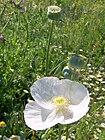Note: This is a project under development. The articles on this wiki are just being initiated and broadly incomplete. You can Help creating new pages.
Difference between revisions of "Papaver somniferum - Khakhasa"
(→External Links) |
(→Photo Gallery) |
||
| Line 66: | Line 66: | ||
Papaver somniferum (1980). (28439398951).jpg | Papaver somniferum (1980). (28439398951).jpg | ||
Papaver somniferum - bourgeon.jpg | Papaver somniferum - bourgeon.jpg | ||
| − | + | File:Papaver somniferum seeds paso2 002 php.jpg|Seeds | |
</gallery> | </gallery> | ||
Revision as of 09:19, 27 May 2019
Khakhasa consists of seed of Papaver somniferum Linn. (Fam. Papaveraceae), a glaucous erect annual herb cultivated under State control in certain areas of Rajasthan, Madhya Pradesh and Uttar Pradesh.
Contents
- 1 Uses
- 2 Parts Used
- 3 Chemical Composition
- 4 Common names
- 5 Properties
- 6 Habit
- 7 Identification
- 8 List of Ayurvedic medicine in which the herb is used
- 9 Where to get the saplings
- 10 Mode of Propagation
- 11 How to plant/cultivate
- 12 Commonly seen growing in areas
- 13 Photo Gallery
- 14 References
- 15 External Links
Uses
Dysentery, Cough, Constipation, Fever, Insomnia.
Parts Used
Chemical Composition
Fixed oil containing esters of linoleic, palmitic, oleic acids.[1]
Common names
| Language | Common name |
|---|---|
| Kannada | Gasgase, Aapheen, Aphini |
| Hindi | Apheem, Postadaanaa, Khaskhas, Khasabija |
| Malayalam | Avin, Karappu, Kashkash, Aalan |
| Tamil | Kasakash, Posttakkaai, Avinee |
| Telugu | Gasgashaalu, Nallamandu |
| Marathi | NA |
| Gujarathi | NA |
| Punjabi | NA |
| Kashmiri | NA |
| Sanskrit | Khasatilaḥ, Āphūkam, Khākhastilaḥ, Khākhasaḥ |
| English | Opium, Poppy Seeds |
Properties
Reference: Dravya - Substance, Rasa - Taste, Guna - Qualities, Veerya - Potency, Vipaka - Post-digesion effect, Karma - Pharmacological activity, Prabhava - Therepeutics.
Dravya
Rasa
Madhura
Guna
Guru
Veerya
Śīta
Vipaka
Madhura
Karma
Vātahara, Rucya, Stambhana, Vedanāsthāpana, Vṛṣya, Balya, Varṇya
Prabhava
Habit
Identification
Leaf
| Kind | Shape | Feature |
|---|---|---|
| Paripinnate | Oblong | Leaf Arrangementis Alternate-spiral |
Flower
| Type | Size | Color and composition | Stamen | More information |
|---|---|---|---|---|
| Unisexual | 2-4cm long | pink | Flowering throughout the year and In terminal and/or axillary pseudoracemes |
Fruit
| Type | Size | Mass | Appearance | Seeds | More information |
|---|---|---|---|---|---|
| oblong pod | Thinly septate, pilose, wrinkled | seeds upto 5 | Fruiting throughout the year |
Other features
List of Ayurvedic medicine in which the herb is used
Where to get the saplings
Mode of Propagation
How to plant/cultivate
A plant mainly of the subtropics, though it can be cultivated in the temperate zone and tropics[3].
Commonly seen growing in areas
Western Ghats, Open areas, Rocky areas.
Photo Gallery
References
- ↑ The Ayuredic Pharmacopoeia of India Part-1, Volume-5, Page no-12
- ↑ [ "Morphology"]
- ↑ "Cultivation detail"
External Links
- Ayurvedic Herbs known to be helpful to treat Dysentery
- Ayurvedic Herbs known to be helpful to treat Cough
- Ayurvedic Herbs known to be helpful to treat Constipation
- Ayurvedic Herbs known to be helpful to treat Fever
- Ayurvedic Herbs known to be helpful to treat Insomnia
- Herbs with Flowers used in medicine
- Herbs with Fruits used in medicine
- Herbs with common name in Kannada
- Herbs with common name in Hindi
- Herbs with common name in Malayalam
- Herbs with common name in Tamil
- Herbs with common name in Telugu
- Herbs with common name in Sanskrit
- Herbs with common name in English
- Habit - Herb
- Index of Plants which can be propagated by Seeds
- Herbs that are commonly seen in the region of Western Ghats
- Herbs that are commonly seen in the region of Open areas
- Herbs that are commonly seen in the region of Rocky areas
- Herbs
- Ayurvedic herbs that don't have seed photos







